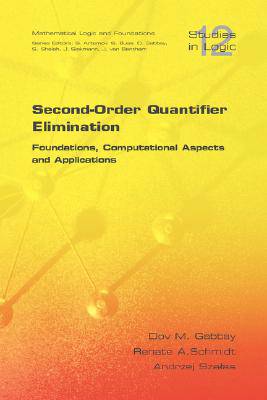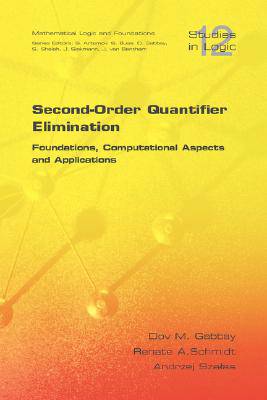
- Retrait gratuit dans votre magasin Club
- 7.000.000 titres dans notre catalogue
- Payer en toute sécurité
- Toujours un magasin près de chez vous
- Retrait gratuit dans votre magasin Club
- 7.000.0000 titres dans notre catalogue
- Payer en toute sécurité
- Toujours un magasin près de chez vous
Second Order Quantifier Elimination
Foundations, Computational Aspects and Applications
D M Gabbay, R Schmidt, A Szalas
50,95 €
+ 101 points
Description
In recent years there has been an increasing use of logical methods and significant new developments have been spawned in several areas of computer science, ranging from artificial intelligence and software engineering to agent-based systems and the semantic web. In the investigation and application of logical methods there is a tension between: * the need for a representational language strong enough to express domain knowledge of a particular application, and the need for a logical formalism general enough to unify several reasoning facilities relevant to the application, on the one hand, and * the need to enable computationally feasible reasoning facilities, on the other hand. Second-order logics are very expressive and allow us to represent domain knowledge with ease, but there is a high price to pay for the expressiveness. Most second-order logics are incomplete and highly undecidable. It is the quantifiers which bind relation symbols that make second-order logics computationally unfriendly. It is therefore desirable to eliminate these second-order quantifiers, when this is mathematically possible; and often it is. If second-order quantifiers are eliminable we want to know under which conditions, we want to understand the principles and we want to develop methods for second-order quantifier elimination. This book provides the first comprehensive, systematic and uniform account of the state-of-the-art of second-order quantifier elimination in classical and non-classical logics. It covers the foundations, it discusses in detail existing second-order quantifier elimination methods, and it presents numerous examples of applications and non-standard uses in different areas. These include: * classical and non-classical logics, * correspondence and duality theory, * knowledge representation and description logics, * commonsense reasoning and approximate reasoning, * relational and deductive databases, and * complexity theory. The book is intended for anyone interested in the theory and application of logics in computer science and artificial intelligence.
Spécifications
Parties prenantes
- Auteur(s) :
- Editeur:
Contenu
- Nombre de pages :
- 320
- Langue:
- Anglais
- Collection :
Caractéristiques
- EAN:
- 9781904987567
- Date de parution :
- 17-04-08
- Format:
- Livre broché
- Format numérique:
- Trade paperback (VS)
- Dimensions :
- 156 mm x 234 mm
- Poids :
- 449 g

Les avis
Nous publions uniquement les avis qui respectent les conditions requises. Consultez nos conditions pour les avis.






